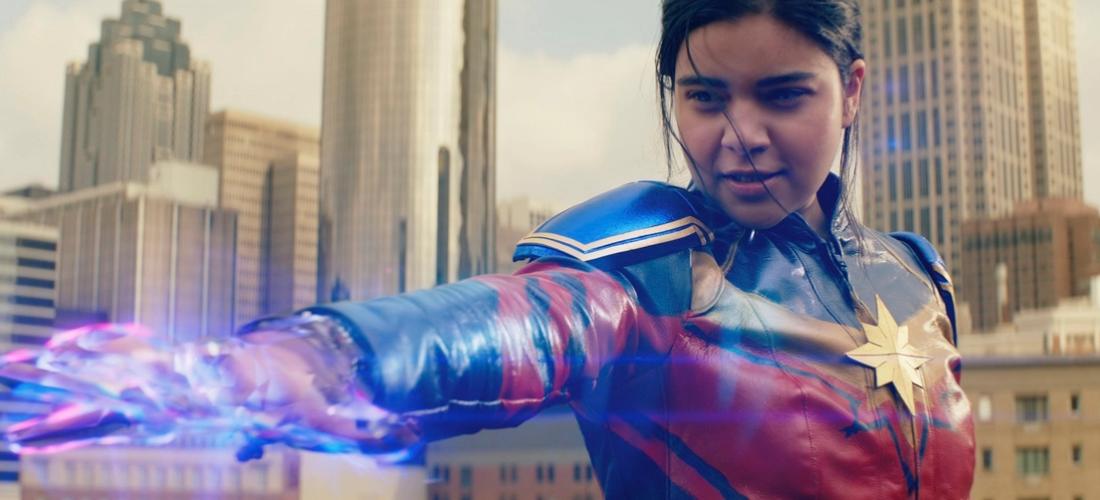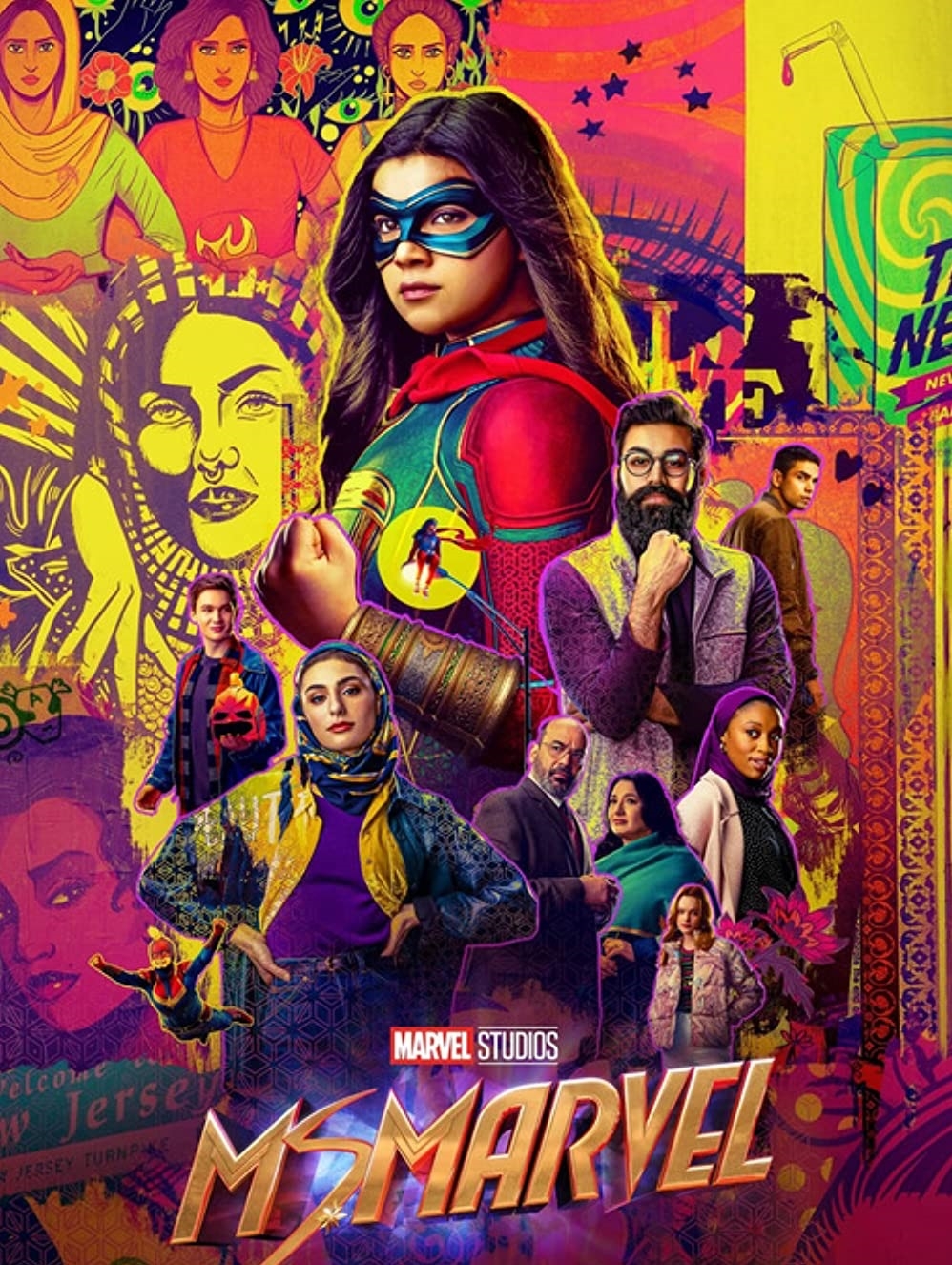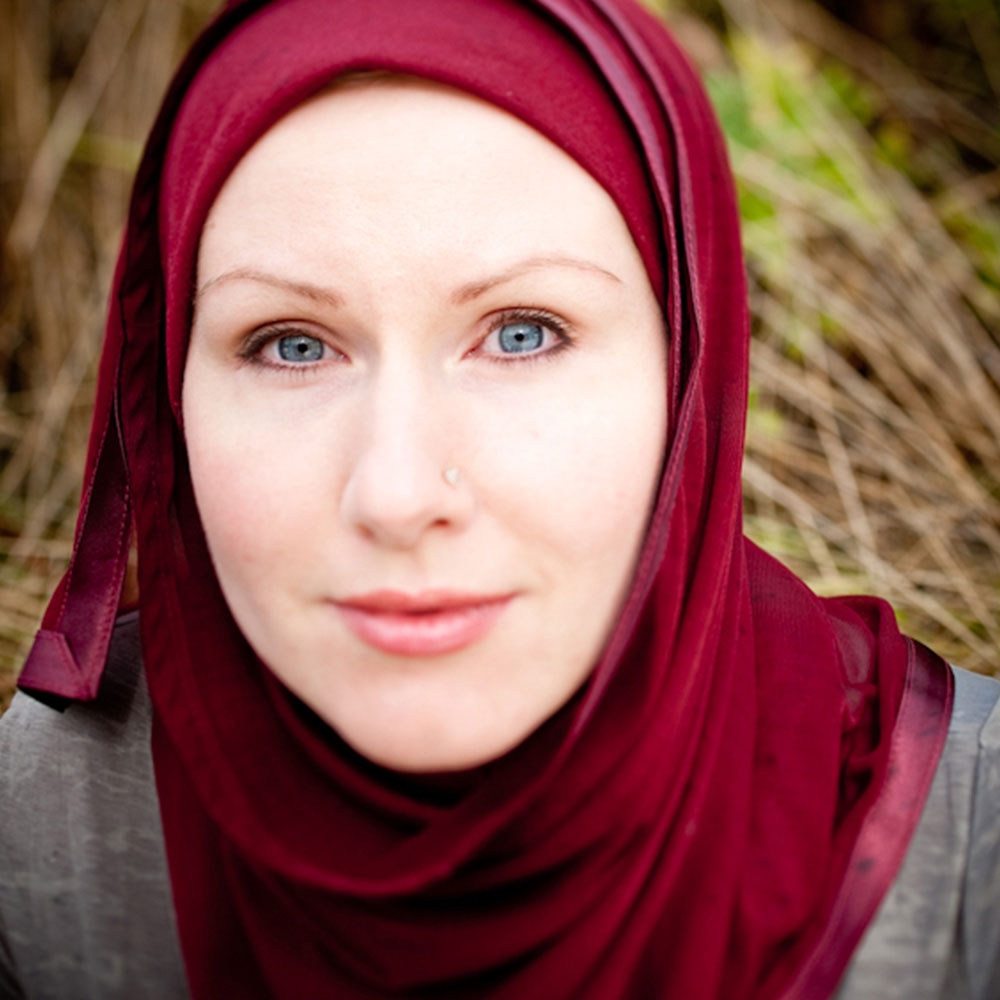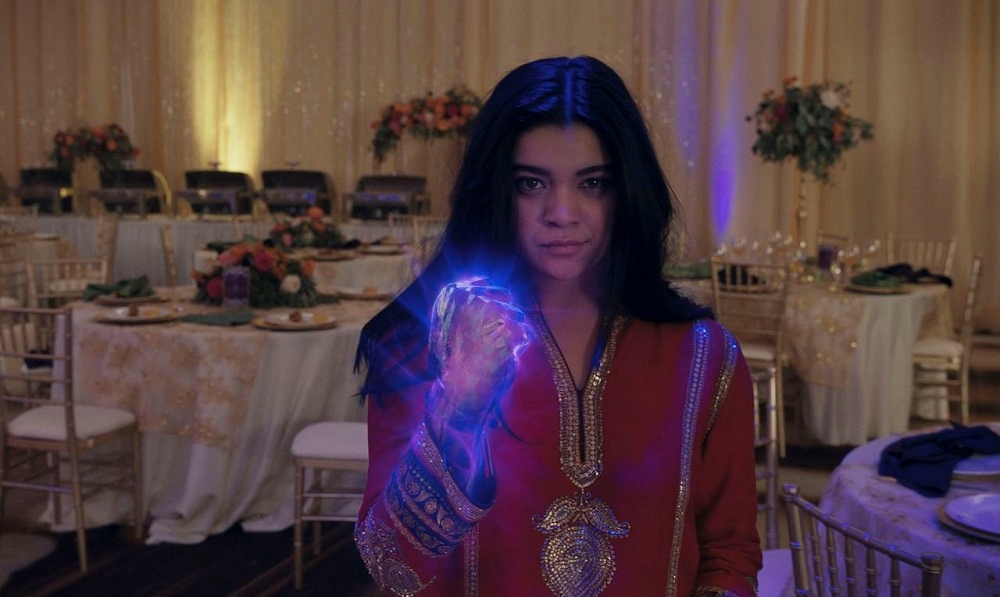How Watching Ms. Marvel Facilitates the Best Conversations With My Daughter
Lifestyle
|
Jun 16, 2022
|
6 MIN READ

Iman Vellani as Ms. Marvel; image source: Disney+
Kamal or Kamina?*
The premiere of Ms. Marvel on Disney+ this week has created a handful of camps: From “Christians Against Ms. Marvel” on Facebook, Muslim influencers calling out tokenization, to millennial Muslims rejoicing at their own reflection in the Marvel Comics Universe, foes and fans of Kamala Khan run the gamut.

But what matters to me (and a lot of other Muslims) is representation and, okay, novelty. So I was excited for the debut of MCU’s latest heroine because I grew up in a world that didn’t look like me on the big screen unless it was in Bollywood. So, I watched A LOT of Bollywood in which no actress is a superhero unless it’s at the tail end of her career. And then she’s a man-hating, avenging serial killer. Gulp. Wrong kind of avenger.
I watched Ms. Marvel’s first episode on my own and loved the small details, such as Ms. Marvel writer and co-creator G. Willow Wilson’s name on the school plaque (a nod to Stan Lee’s cameos – I see you, MCU!), a spot on Urdu cuss, animated graphics telling us the story, the new tabla-heavy soundtrack, and “Allah” (S) repeated in a positive light. A superhero with a religion, not just a vague creed. And, it’s MY religion. Muslim representation in Hollywood has been negative for so long, I’m in suspended disbelief now that it’s happening.
What I loved most was watching the first episode again with tween Baby Girl later that night. I sat just behind her to observe her reactions. Within the first minutes of the episode, Kamala’s brother is making dhikr. I heard my daughter’s sharp inhale before her head whipped around to face me with elation. There was no other way to describe her countenance. That reaction alone was enough for me to thumb my nose at anyone who criticizes the show – because my daughter saw her life on that screen.

Ms. Marvel poster; image source Disney+
She pointed to familiar foods that her melanin-deficient dance peers couldn’t pronounce. She saw a superhero story with a faith attached to it, and it was hers. She asked me to translate Urdu and Punjabi words she never cared to understand before. Many of my Muslim American friends growing up wore monoligualism like a badge of honor because maybe if they refused to learn the languages of their parents and grandparents, they’d be accepted; they’d be REAL Americans.
Well, 9/11 upended those efforts.
What follows below is the juiciest parts of our discussion with minimal spoiler alerts, but if you watched any Bollywood in your life, it’s already been done for you: Girl loves something or someone, wants to go with or to something related, and parents forbid it. Rebellion ensues.
“It’s really cool that she’s Pakistani and Muslim like us,” Baby Girl offered and with emphasis, “But I do NOT like her mom.”
I don’t like Kamala’s mom either, but I get her. I DIDN'T get her when my own mom parented exactly like that, armed with a chappal (the equivalent of chaclas or a flip flop; IFYKYK) or wooden spoon. I understand the overbearing, culinarily gifted, anti-American norms of immigrant moms, the prima antagonista of brown tweens and tweens. I was on the receiving end of that once. So, I didn’t get defensive. I got curious.
“Tell me what you didn’t like about her,” I said.
“She doesn’t trust her daughter. Do you trust me?”
Oooh. Good question. I have no reason not to, but my home-educated 11-year-old is nowhere near attending parties or events without me. My thought is, “We trust YOU, but we don’t trust anyone else,” which satisfies no hot-blooded teen, as Kamala’s story demonstrates.
“Would you let me go to AvengerCon?” she asked.

G. Willow Wilson, Ms. Marvel co-creator and writer of the comic book series.
“Sure, we love Avengers. I’d go with you.” I held my breath, afraid that she’d reject this option, but she didn’t. If you ever feel comfortable parenting, hang on. There’s a left hook coming.
“Okay because if you didn’t I would sneak out, too.”
Well, butter my buns and call me biscuit. “FYI, her mom’s reaction isn’t realistic,” I said. “I would beat the CRRRAAP out of you.” Emphasis, mine. Pounding blood whistling in my ears, also mine.
“No you wouldn’t,” she replied.
And no, I wouldn’t because I’ve read too much and learned early enough that love is in our sunnah, not corporal punishment. Love allows room to learn like Prophet Muhammad (saw) showed us. Punishment just teaches and instills fear.
To clear my head, I probed, “Why do you think her mom said ‘no’?”
With little thought, she offered, “She’s afraid.” Well, dang, that took me at least 35 years to figure out! How is my kid so emotionally intelligent?
“Of what?”
“Of boys, like she said.”
“Or maybe things she doesn’t know. A lot of people act out of fear, don’t you think? They buy guns out of fear, shoot them out of fear, hate other people they don’t know out of fear.” I gave her a moment while she nodded along. “Am I like that [Kamala’s mom]?”
“No, but you say ‘no’ a lot.”
“To electronics. But I try not to practice fear-based parenting,” I told her. Some defensiveness is justified.
This gave her pause. “Maybe something happened to them when they were kids so they became parents like that.” I have a little therapist in the making here. Are you reading this, Harvard?
“Wow, very good. That’s likely. Maybe trauma they don’t even know about. What do you think Kamala’s mom’s trauma is?”
“I don’t know.” And then she posed, “Maybe [it’s her] Nani, if she said ‘no’ a lot.” And then her face brightened. This is the real spoiler alert if you want to stop reading. “Maybe Nani has powers, too because it’s HER bracelet!”

Scene from Ms. Marvel; image source Disney+
“Yeah, I really want to meet Nani.” When conversations are rolling like this with a tween, I’d be an idiot not to bank on it. “So what do you think about her best friend being a boy?”
She shrugged effortlessly. “He’s just a friend. Your best friend was a boy.”
This is true, and I’ve shared it with my kids to teach them what appropriate relationships can look like. “Okay, but what if he becomes her boyfriend?”
Baby Girl laughed at me. “Mama, Muslims don’t date.” My dear, naive, little buttercup. It would hurt me more than it hurt her to burst that bubble.
“Oh yes, they do.” I ignored her huge eyes. “They’re not SUPPOSED to, but some of them ignore that and date anyway. What if they like each other?” If I don’t ask her hard questions now, she will ask them of herself later, or worse, ask her inexperienced peers. So if you think I’m “giving her ideas,” I don’t have to. They’ll sprout without me when I’m not paying attention.
“No, they’ll just be friends. Okay, I’m going to bed.” And she bounded out of the room while my mouth was still hanging open.
If this anticlimactic end to the beginning of a revelatory conversation bothers you, this is motherhood. Learning can’t be forced. When kids are done, they will let us know as my daughter did: Thanks for the movie and the talk, but I’m tired, likely overwhelmed and uncomfortable with this new information, so see ya’.
Seeds can always be planted, though, and Ms. Marvel provided me with a whole packet of them. We will be watering them at our house for five more episodes, and I encourage momsisters not to fear; add it to your family screen schedule and watch it together. Also, join our Facebook group to discuss your parenting thoughts, fears, and predictions about Ms. Marvel with our Muslim mom community.
May Allah make us witness the kamal of all our seeds bear fruit. Ameen.
* Kamal is the Urdu for “marvel” or “marvelous” and Kamina is the Urdu for “cruel person."
Dr. Uzma Jafri is originally from Texas, mom to four self-directed learners, a volunteer in multiple organizations from dawah resources to refugee social support services, and runs her own private practice. She is an aspiring writer and co host of Mommying While Muslim podcast, tipping the scales towards that ever elusive balance as the podcast tackles issues second generation Americans have the voice and stomach to tackle.
Subscribe to be the first to know about new product releases, styling ideas and more.
What products are you interested in?


